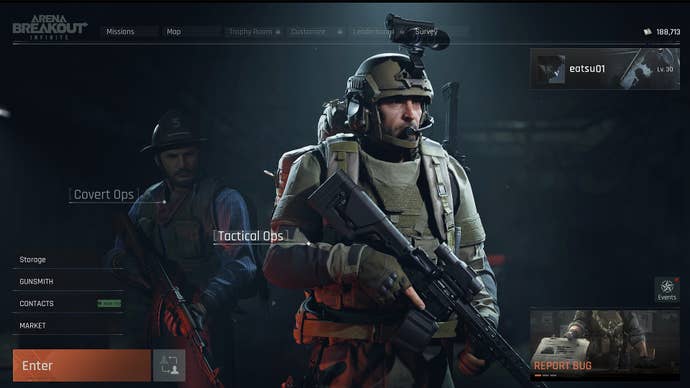Products You May Like
Suggesting that a Chinese company is trying to copy the success of a major Western competitor by creating its own version of its product is a timeless statement that doesn’t require any context. It’s not that uncommon in the realm of video games – there was a very high-profile case regarding Overwatch and a Chinese clone, for example, as well as more recent takes on Hearthstone and Palworld and Valorant. Yes, this trend has been getting a little more brazen lately.
Tencent, the Chinese conglomerate whose fingers are already in many Western pies, is generally known as one of the biggest tech companies and game publishers in China and the world. In recent years, the company has been investing more and more of its money into Western teams.
It seems like a sensible strategy, though it clearly hasn’t stopped the Chinese financial giant from nurturing its own teams in China for what now looks like developing legally distinct versions of the most popular games in the West.
In most industries, this would be a downright accusation, but games are a little different. Everyone knowns that genres aren’t really born until someone copies something popular, riffs on it, and begins a trend. Roguelikes, Soulslikes, Metroidvanias, Bullet Heavens (or: Survivors-likes) are all good examples. But there’s always been an unspoken rule to not copy the entire sheet of homework.
Tencent is responsible for two games I want to highlight here. Delta Force: Hawk Ops, and Arena Breakout: Infinite. The first does at least have the legendary IP attached to it, but when you see it in action, it comes across as a take on Battlefield multiplayer. More specifically, it’s taking more than a few cues from Battlefield 2042.
There’s an emphasis on destruction in maps that look like they’re very liberally inspired by some of the Battlefield series’ most iconic and recognisable. It has a roster of characters not unlike BF2042’s dreaded heroes. And, just like them, they too have unique gadgets and passive abilities. Even its extraction mode seems to have been inspired by BF2042’s ill-fated Hazard Zone.
The only real difference is the Black Hawk Down-inspired campaign, which also serves as a tech showcase.
As a longtime Battlefield fan, I am mostly fine with all that. I am not thrilled that Hawk Ops decided to recreate Battlefield 2042 rather than, say, Battlefield 3 or 4, but any series fan worth their salt knows that Battlefield is in need of some serious competition.
This is especially true when you consider how the core aspects of the series are either poorly recreated by other shooters, or avoided entirely. But my issue is that, while some of Hawk Ops’ soldier abilities aren’t copies of BF2042’s, it seems like they’re cut from the same cloth. Maybe my opinion will change when I get my hands on it, but right now, it seems like the developers artificially limited themselves to what already exists.
Arena Breakout: Infinite is the more curious, and certainly more brazen of the two. It’s the product of the Tencent-owned Morefun Studios, a team that doesn’t appear to have any shooter experience. It may have a non-descript, generic name, but this is Tencent’s take on Escape from Tarkov.
Tarkov remains the premier extraction shooter, having practically birthed the subgenre. There’ve been attempts at recreating its formula, and while some games have been more successful than others, nothing comes close.
Breakout is the closest, well, recreation of Tarkov – except it’s free-to-play. In gameplay terms, it attempts to sand off some of Tarkov’s roughest edges, by limiting the fear of losing gear in botched raids, and allowing for some persistency between raids.

When you see it in action, it’s hard to distinguish Breakout from Tarkov. This encompasses everything from the visual quality, the tone, the weapon and character animations, and the way the games handle weapon sights and lenses – it’s all a little too close. So close, in fact, that Tarkov devs have outright accused MoreFun of stealing their code.
Also curious are those studio names, which really only seem to exist as one extra layer of obfuscation. It’s pretty clear that anti-Chinese sentiments, especially in the world of social media and tech, are on the rise in the West. It wouldn’t be a leap to suggest that Tencent doesn’t want its well-recognised name to be associated with with every game it makes. This was likely also part of the inceptive to create sub-labels like Level Infinite; you’ll know they’re Tencent-backed if you looked, but the majority of people aren’t looking.
But one thing Tencent just can’t seem to move past is its insistence on making its games available on mobile alongside PCs and consoles. I don’t think I have to explain why that could limit everything from the mechanical depth of those games to their visual quality.
While Arena Breakout: Infinite isn’t itself technically available on phones, it evolved from the mobile game Arena Breakout, and the former really feels like a more expanded version of what a Tarkov on phones would look like. Hawk Ops, however, will be available on everything – with the assumption being that all platforms will be able to play together.
I understand how massive the mobile audience is, and how lucrative it is for Tencent specifically (especially when you factor in the walled garden of Chinese gaming), but that also incentives it to make safe games that need to entertain a wide range of players. As slightly dressed-up clones, those games are already diluted, and necessitating a mobile version robs them of any edge they could’ve otherwise had if they focused on their respective niches.
Only time will tell on each respective game’s staying power, but right now, they look like games that want to succeed everywhere and be for everyone, a formula that’s rarely responsible for interesting games.
